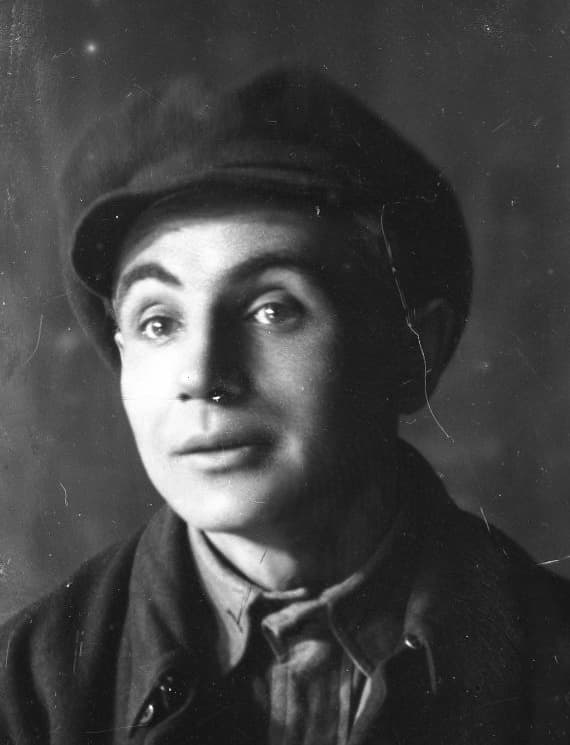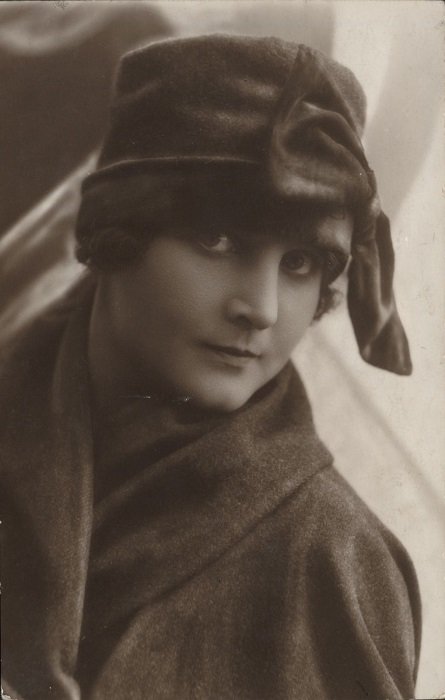September 8, 1989 – July 22, 1986
Natalia Uzhvii was a Ukrainian theater and cinema actress.
She was born in Liuboml (today Volyn оblast) and attended the railroad school and later the municipal school. Having passed the external teaching exam, in 1914 she becomes a teacher in a village school. She joins an amateur theater group while working in a school in Zolotonosha. Her first role was that of a tenant in Gabriela Zapolska’s The Morality of Mrs. Dulska. In 1920 the group becomes a traveling theater with the agitbrigade of the People’s Commissariat of Education of the Ukrainian SSR. In 1921, the head of the public education department, I. Moisei, sends Natalia Uzhvii to Kyiv to take directing courses. A year later she joins the theater studio of the Taras Shevchenko First Theater of the Ukrainian SSR in Kyiv, under the leadership of Ivan Marianeneko. In 1925 Uzhvii becomes an actress with the Odesa State Ukrainian Drama Theater, before joining the Berezil Theater a year later. She plays Froumence in Fernand Crommelynck’s Golden Guts (1926); Sadie in John Colton and Clemence Randolph’s play Sadie Thompson, based on Somerset Maugham’s short story “Rain”; Maguelonne in Victor Hugo’s The King Amuses Himself (1927); Julia in Friedrich Schiller’s Fiesco’s Conspiracy at Genoa (1928); Auntie Motia in Mykola Kulish’s Myna Mazailo (1929); Chereda in Ivan Mykytenko’s Cadres (1931); Maklena in Mykola Kulish’s Maklena Grasa (1933).
She gains her first cinematic experience while still working in Odesa: first she plays Polish spy Halia Dombrovska in Heorhii Stabovyi and Aksel Lundin’s film P.K.P. (1926), then she stars in Petro Chardynin’s historical film Taras Triasylo as the protagonist’s sister – the strong-willed country girl Maryna, who resists the lord’s advances. In 1935 she plays the insidious brothel madam Nastasia Markivna in Ivan Kavaleridze’s Prometheus.
After Berezil closes in 1936 she works at the Ivan Franko Kyiv Drama Theater and plays numerous roles, such as: Elizabeth in Friedrich Schiller’s Don Carlos; Anna Andriivna in Mykola Hohol’s The Inspector General; Yulia Tugina in Alexander Ostrovsky’s The Last Victim; Beatrice in William Shakespeare’s Much Ado About Nothing; and Filumena Marturano in Eduardo De Filippo’s Filumena Marturano. One of her pivotal roles was Anna in Ivan Franko’s Stolen Happiness. Uzhvii’s repertoire included plays by Ukrainian Soviet playwrights: Oleksandr Korniichuk, Oleksandr Levada and Mykola Zarudnyi.
She continues to star in films: Stekha in Heorhii Tasin’s Nazar Stodolia (1937), inspired by Taras Shevchenko’s play; Oliana in Heorhii Tasin’s Karmeliuk; Yevdokia in Hryhorii Kozintsev and Leonid Trauberg’s The Vyborg Side (1938); the sister-in-law in Mykola Sadkovych’s May Nights, based on works by Mykola Hohol (1940); Shevchenko’s sister Yaryna in Ihor Savchenko’s Taras Shevchenko (1951); Maria in Amvrosii Buchma and Oleksii Shvachko’s Earth, based on the novel by Olha Kobylianska (1954). The artist combined her experience in theater and cinema in her film performances: she played Anna in Isaak Shmaruk and Hnat Yurii’s Stolen Happiness (1952); Natalia Kovshyk in Tymofii Levchuk’s Guelder Rose Grove (1953); Lucy Cooper in Yurii Suiarko’s Give Way… (1970).
The role that would bring her international recognition would be partisan Olena, the Ukrainian wartime Madonna in Mark Donsky’s Rainbow (1943) (awarded the Stalin Prize). On both stage and screen Natalia Uzhvii impressed with her variety of roles, deep artistic images and acting skills. In an interview she credited Les Kurbas and Hnat Yura for her knowledge and skills.
In 1954-1973 Nataliia Uzhvii headed the Ukrainian branch of the Theater Society and was involved in the professional education of a new generation of theater artists.
Natalia Uzhvii was an outstanding actress of Ukrainian theater and cinema, recognized not only by audiences and critics but also by the then authorities. She was awarded a number of state prizes and titles: People’s Artist of the USSR (1944), Hero of Socialist Labor (1974), Stalin Prizes (1946, 1949, 1951), Taras Shevchenko State Prize of the Ukrainian SSR (1984).


